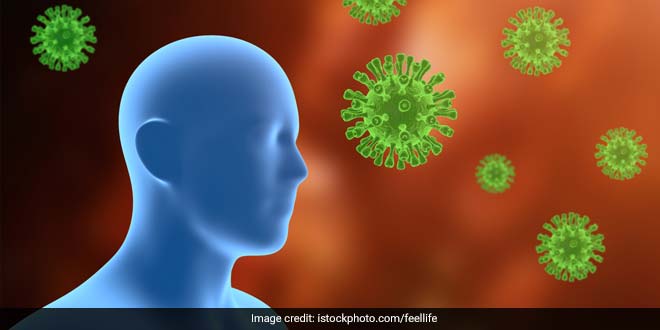Highlights
- More than 4 reinfection cases have been confirmed globally: Scientists
- COVID-19 infection does not guarantee protection against reinfection: Study
- The study was published in the journal Lancet Infectious Diseases
Houston: COVID-19 patients infected with the novel coronavirus for a second time might experience more severe symptoms, according to a study which is the first to confirm a case of reinfection with the virus in the US. The study, published in the journal Lancet Infectious Diseases, found evidence that an individual with no known immune disorders or underlying conditions was infected with the SARS-CoV-2 virus in two separate occurrences. According to the scientists, including those from the University of Nevada in the US, the patient, a 25-year old male, was infected with two distinct SARS-CoV-2 variants within a 48-day time frame, while testing negative in between infections.
The study noted that the patient’s second infection was more severe, resulting in hospitalisation with oxygen support, indicating previous exposure to COVID-19 may not translate to guaranteed total immunity. The patient tested negative for the virus after testing positive for SARS-CoV-2 in April 2020, the researchers said.
Also Read: Coronavirus Explainer: What Is COVAX Initiative?
Then in June 2020, after experiencing severe COVID-19 symptoms, including fever, headache, dizziness, cough, nausea, and diarrhea, the patient was hospitalised and tested positive for a second time. The patient has since been discharged from the hospital and has recovered from the second infection, the study noted. While further research into reinfections is required, the scientists believe all individuals – whether previously diagnosed or not — should take identical precautions to prevent infection with SARS-CoV-2.
There are still many unknowns about SARS-CoV-2 infections and the immune system’s response, but our findings signal that a previous SARS-CoV-2 infection may not necessarily protect against future infection,” said Mark Pandori, lead author of the study from the University of Nevada. It is important to note this is a singular finding and does not provide generalisability of this phenomenon, Mr Pandori said.
While more research is needed, the scientists said the possibility of reinfections could have significant implications for understanding COVID-19 immunity, especially in the absence of an effective vaccine.
Also Read: Coronavirus Explained: What Are The Phases In The Clinical Trials Of The COVID-19 Vaccine?
It also strongly suggests that individuals who have tested positive for SARS-CoV-2 should continue to take serious precautions when it comes to the virus, including social distancing, wearing face masks, and handwashing, Mr Pandori explained.
According to the scientists, at least four other reinfection cases have been confirmed globally in Belgium, the Netherlands, Hong Kong, and Ecuador with the latter being the only other instance in which the second infection displayed worse disease outcomes than the first.
We need more research to understand how long immunity may last for people exposed to SARS-CoV-2, and why some of these second infections, while rare, are presenting as more severe, Mr Pandori said. So far, we’ve only seen a handful of reinfection cases, but that doesn’t mean there aren’t more, especially as many cases of COVID-19 are asymptomatic. Right now, we can only speculate about the cause of reinfection, he added.
The study noted several hypotheses that may explain the severity of the second infection, including the possibility the patient subsequently encountered a very high dose of the virus which caused a more acute reaction the second time.
According to the researchers, the patient may also have come in contact with a more virulent variant of the virus. They said another plausible explanation could be the mechanism of antibody dependent enhancement in which some protective proteins produced by the immune system during the first encounter with the virus could make a subsequent infection worse.
This mechanism, the researchers noted, was seen previously with the 2002-03 SARS pandemic virus, as well as other diseases, such as dengue fever. Citing the limitation of the study, the researchers said they were unable to undertake any evaluation of the immune response to the first episode of infection.
Since the confirmed reinfection cases occurred among patients who displayed COVID-19 symptoms, the scientists believe there is a possibility that many similar cases among individuals may be asymptomatic, and therefore likely to remain undetected under current testing and monitoring practices.
(Except for the headline, this story has not been edited by NDTV staff and is published from a syndicated feed.)
NDTV – Dettol Banega Swasth India campaign is an extension of the five-year-old Banega Swachh India initiative helmed by Campaign Ambassador Amitabh Bachchan. It aims to spread awareness about critical health issues facing the country. In wake of the current COVID-19 pandemic, the need for WASH (Water, Sanitation and Hygiene) is reaffirmed as handwashing is one of the ways to prevent Coronavirus infection and other diseases. The campaign highlights the importance of nutrition and healthcare for women and children to prevent maternal and child mortality, fight malnutrition, stunting, wasting, anaemia and disease prevention through vaccines. Importance of programmes like Public Distribution System (PDS), Mid-day Meal Scheme, POSHAN Abhiyan and the role of Aganwadis and ASHA workers are also covered. Only a Swachh or clean India where toilets are used and open defecation free (ODF) status achieved as part of the Swachh Bharat Abhiyan launched by Prime Minister Narendra Modi in 2014, can eradicate diseases like diahorrea and become a Swasth or healthy India. The campaign will continue to cover issues like air pollution, waste management, plastic ban, manual scavenging and sanitation workers and menstrual hygiene.
[corona_data_new]



















